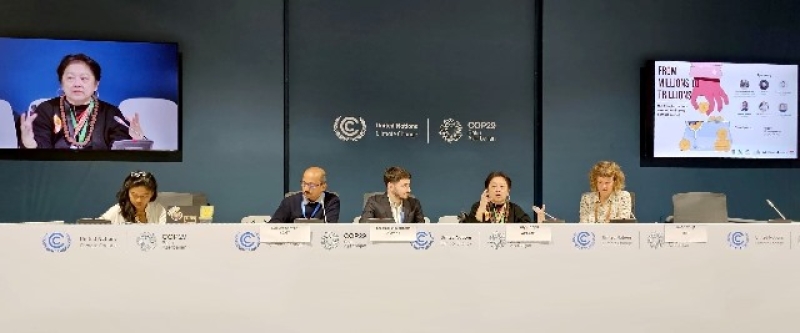- Janaza of six Bangladeshi peacekeepers held at Dhaka Cantonment |
- Bangladesh stock market loses Tk 10,500cr in a week |
- Dhaka’s air turns ‘very unhealthy’ on Sunday morning |
- Project to transform N’ganj into a climate-resilient green city |
- Sustainable, rights-based solutions to Rohingya crisis urged |
Bangladesh requires $3.5 bn a year for climate resilience
CSOs demand increased climate finance at COP29

CSOs at a civil society dialogue during the ongoing COP29 Global Climate Conference in Baku._11zon
Baku, Azerbaijan, Nov 16 – Bangladesh, one of the world’s most vulnerable countries to climate change, requires USD 3.5 billion per year to strengthen its climate resilience, according to Aminul Hoque from COAST Foundation, Bangladesh.
Speaking at a civil society dialogue during the ongoing COP29 Global Climate Conference in Baku, Hoque stressed the need for substantial financial support from developed nations to meet the climate challenges faced by Bangladesh and other Least Developed Countries (LDCs), according to a press release on Saturday.
Civil society leaders gathered at the conference on Friday to demand USD 1.5 trillion under the new climate finance goal for the 2025-30 period. The demand, part of a broader call for climate justice, was made in the context of a draft text on the New Collective Quantified Goal (NCQG), which is currently being negotiated at the summit.
Hoque highlighted that Bangladesh, which is highly susceptible to the impacts of climate change, does not have the capacity to mobilise additional resources for survival spending. He argued that the financial burden for addressing climate vulnerabilities should be borne by the developed nations, as they are primarily responsible for the global climate crisis. Under the Paris Agreement, developed countries are obligated to provide financial support to vulnerable nations, a principle reflected in Article 9.1 of the agreement.
“We need USD 3.5 billion per year to ensure that Bangladesh can address its climate vulnerabilities and build resilience,” said Hoque. “This is not for development, but for survival. Developed countries must honour their commitment to financing climate action, as they are responsible for the crisis we are facing.”
The demand for USD 1.5 trillion in climate finance was echoed by Lidy Nacpil, a representative from the Asia Pacific Movement on Debt and Development, who emphasised that the current NCQG must mobilise adequate financial support for vulnerable communities. Nacpil added that estimates suggest that LDCs alone will require USD 220 billion per year to implement their Nationally Determined Contributions (NDCs) by 2030.
She urged that the NCQG should align with the needs and priorities of developing countries, incorporating specific provisions for LDCs and Small Island Developing States (SIDS).
At the dialogue, Ezequiel Steuermann of the Network for Economic, Social and Cultural Rights (ESCR) stressed the importance of clearly defining what constitutes climate finance, calling for a focus on new, additional, predictable, and grant-based resources that do not impose debt on developing nations.
The civil society leaders also expressed concern over the draft NCQG, which includes multiple negotiating options with unclear implications, potentially delaying progress on critical climate financing commitments. They warned that the absence of the Common But Differentiated Responsibilities with Respective Capacities (CBDR-RC) principle could lead to the unfair distribution of financial responsibilities, shifting the burden onto LDCs like Bangladesh.
As the negotiations continue at COP29, civil society groups remain steadfast in their call for immediate, clear, and predictable climate finance to ensure that countries like Bangladesh are not left behind in the global effort to combat climate change. - UNB

